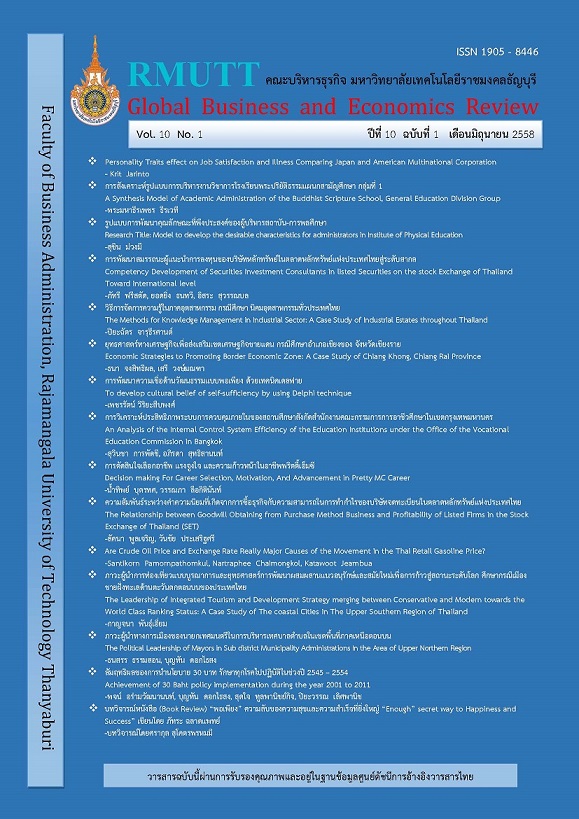THE LEADERSHIP OF INTEGRATED TOURISM AND DEVELOPMENT STRATEGY MERGING BETWEEN CONSERVATIVE AND MODERN TOWARDS THE WORLD CLASS RANKING STATUS: A CASE STUDY OF THE COASTAL CITIES IN THE UPPER SOUTHERN REGION OF THAILAND
Keywords:
The Integrated Tourism Leaderships, Mixed Conservative – Modern Development Strategy, Towards the World Class Ranking StatusAbstract
The main object in this dissertation is to study and analyze ideas and attitude of leaders and leadership about the integrated Tourism and strategic development mixing with conservatives and modern style presentation the pattern of world level status the future: A Case Study of The coastal Cities in The Upper Southern Region of Thailand The methodology used both in qualitative and quantitative research collected by in-depth interviews the key Informants group and 50 expert’s who had been directly affected from leader group, executives, political representative both the national and local level, government and private sector, academic sector both in strategic leadership and tourism and mass communication both in religion and community leader. Then the data from a qualitative study has been taken to study the quantitative research methods by using questionnaires that were created to poll the members of 286 Local Administrative Leadership as models. The research result, it shows the overview as “The Leadership of Integrated Tourism and Development Strategy merging between Conservative and Modern Towards The World Class Ranking Status : A Case Study of The coastal Cities in The Upper Southern Region of Thailand” in the past, present and also future which it can describe the analysis of data in both qualitative and quantitative forms from “ The Classic Vintage Destination” To “The NeoRenaissance Rendezvous” The study suggested that, the Integrated Tourism Leaderships must be modified from the role “ The Classic Vintage Destination” To “The Neo-Renaissance Rendezvous” make it beneficial for Mixed Conservative – Modern Development Strategy Towards The World Class Ranking Status of the Upper Southern Region of Thailand in the Future.
References
ชนะศักดิ์ ยุวบูรณ์. (2543). กระทรวงมหาดไทยกับการบริหารจัดการที่ดีในการปกครองที่ดี. กรุงเทพฯ: บพิธการพิมพ์.
ชัช กิตตินพภดล. (2547). ความหมายของคำว่าบูรณาการ. กรุงเทพฯ: ซีอีโอนิวส์.
ดรรชนี เอมพันธุ์ (2545). การจัดการทรัพยากรการท่องเที่ยว. กรุงเทพฯ: มหาวิทยาลยัสุโขทัยธรรมาธิราช.
ธานินทร์ ศิลป์จารุ. (2552). การวิจัยและวิเคราะข้อมูลด้วยสถิติด้วย SPSS. กรุงเทพฯ: ซีเอ็ด ยูเคชั่น.
นงนภัส เที่ยงกมล. (2550). การบริหารยุคโลกาภิวัตน์. กรุงเทพฯ: แสงชัยการพิมพ์.
นิศา ชัชกุล. (2555). อุตสาหกรรมการท่องเที่ยว (พิมพ์ครั้งที่ 4). กรุงเทพฯ: จุฬาลงกรณ์มหาวิทยาลัย.
บุญเลิศ จิตตั้งวัฒนา. (2548). อุตสาหกรรมการท่องเที่ยว. กรุงเทพฯ: มหาวิทยาลัยธรรมศาสตร์.
บุญเลิศ จิตตั้งวัฒนา. (2549). การพัฒนาและการอนุรักษ์แหล่งท่องเที่ยว. กรุงเทพฯ : เพรสแอนด์ดีไซด์.
บุญหลิบ พานิชชาติ. (2547). การท่องเที่ยวโลกและมาตรฐานการท่องเที่ยวสากล. กรุงเทพฯ: มหาวิทยาลัยสุโขทัยธรรมาธิราช.
ประภัทร สุทธาเวศ. (2550). วิวัฒนาการและพัฒนาการการท่องเที่ยว. ปทุมธานี: มหาวิทยาลัยรังสิต.
รำไพพรรณ แก้วสุริยะ. (2547). การท่องเที่ยวเชิงนิเวศ. กรุงเทพฯ: มหาวิทยาลัยสุโขทัยธรรมาธิราช.
รุ่งทิพ ว่องปฏิการ. (2547, มกราคม–มีนาคม). การท่องเที่ยวกับการจัดการด้านสิ่งแวดล้อม. จุลสารการท่องเที่ยว, 20(1).
เสรี พงศ์พิศ. (2545). วิสาหกิจชุมชนไม่ใช่ธุรกิจชุมชนในวิสาหกิจชุมชนกลไกเศรษฐกิจฐานราก. กรุงเทพฯ: เอดิสันเพรส.
อรไท ครุฑเวโช. (2550). การมีส่วนร่วมของชุมชนเพื่อการพัฒนาการท่องเที่ยวอย่างยั่งยืนในจังหวัดภูเก็ต. วารสารการบริการและการท่องเที่ยวไทย, 3(2), 80-90.
Fagence, M. (1977). Citizen participation in planning. Oxford: Pergamon Press.
Graen, G. B., & Uhl-Bien, M. (1995). The theory of leader–making. Chicago: Rand Mcnally.
Weaver, D., & Oppermann, M. (2000). Tourism management. Brisbane: John Wiley & Sons.
Weihrich, H., & Koontz, H. (2005). Management. New York: McGraw-Hill.
Yukl, G. A. (1989). Leadership in organizations (4th ed.). Englewood Clifffs, New Jersey: Prentice-Hall International.
Downloads
Published
How to Cite
Issue
Section
License
The articles published in this journal are the intellectual property of their respective authors.
The views and opinions expressed in each article are solely those of the individual authors and do not reflect the positions of Rajamangala University of Technology Thanyaburi or any of its faculty members. All components and content of each article are the sole responsibility of the respective authors. In the event of any errors, the authors shall bear full responsibility for their own work.








